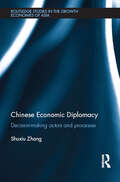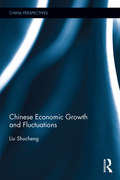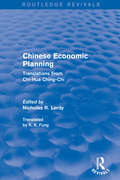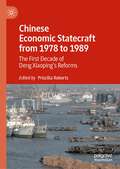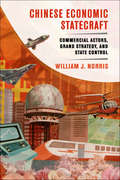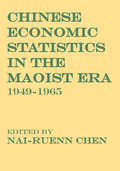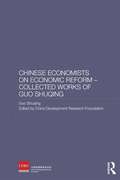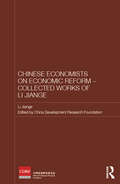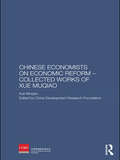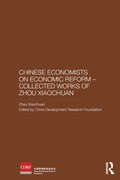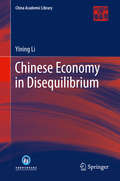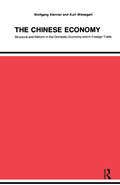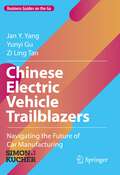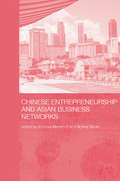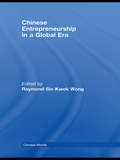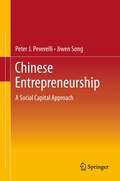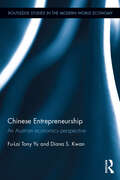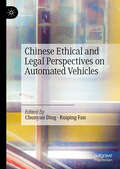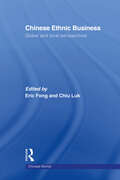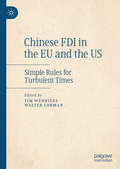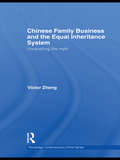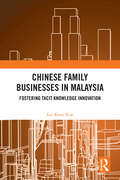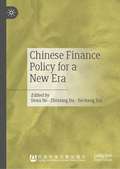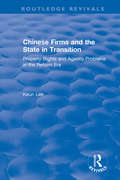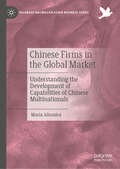- Table View
- List View
Chinese Economic Diplomacy: Decision-making actors and processes (Routledge Studies in the Growth Economies of Asia)
by Shuxiu ZhangEconomic diplomacy was declared in 2013 by Beijing as a priority in its "comprehensive" strategy for diplomacy. The political elite undertook to further invest in economic diplomacy as an instrument for economic growth and development. Globally, Chinese cooperation in multilateral economic processes has become critical to achieving meaningful outcomes. However, little understanding exists in current literature on the factors and mechanisms which shape the processes behind China’s economic diplomacy decision-making. Chinese Economic Diplomacy provides an understanding of the processes and practices of China’s economic diplomacy, with multilateral economic negotiations as the primary basis of analysis, specifically the UN climate change talks and the WTO Doha Round trade negotiations. It examines how early economic diplomacy in global governance contributed to the varied and evolving nature of its present-day decision-making structures and processes. Demonstrating how China’s negotiation preferences are driven by networks of political actors in formal and informal domestic and systemic environments, it also highlights the capacity of international negotiation practices to alter and re-shape China’s approach to multilateral economic negotiations. As a consequence, the book presents a framework for understanding China’s economic diplomacy decision-making processes that is systemically constructed by domestic and international agencies. Offering a Chinese perspective of the notion of economic diplomacy, this book will be of interest to students and scholars of Chinese Economics, International Relations and Political Economy.
Chinese Economic Growth and Fluctuations (China Perspectives)
by Liu ShuchengSince the economic reform of the 1980s, Chinese economy has boomed and has now become the second largest in the world. Based on the constant and systematic researches of economic periodicity, this book studies Chinese economic growth and fluctuations. As a famous Chinese economist, the author is the first one who demonstrated the investment periodicity in China. His groundbreaking studies on Chinese economic periodic fluctuation have significant impact at home and abroad. The first six papers collected in this book mainly examine issues on Chinese periodic fluctuation and macroeconomic regulation, including the periodic fluctuations from 1953 to 1994, and a comparative analysis of five macroeconomic regulations since the reform and open up in the late 1980s. The last seven papers appear in the author's collected works for the first time. They are focused on the new characteristics of Chinese macroeconomic operation and regulation after the financial crisis of 2007-2008. In addition, this book reviews on China's economic growth from 1949 to 2009 and provides some valuable suggestions on how to maintain the rising trend of the new economic cycle.
Chinese Economic Planning: Translations From Chi-Hua Ching-Chi
by Nicholas R. Lardy K. K. FungThis title was first published in 1978. This volume brings together translations of a series of fundamental articles that are of special value for those who seek to understand ChinaTs system of economic planning. These materials, which were intended to provide a basic introduction to the principles and techniques of economic planning being introduced during the First Five-Year Plan, originally appeared in two series in the journal Chi-hua ching-chi (Economic Planning), the official organ of the State Planning Commission and the State Economic Commission.
Chinese Economic Statecraft from 1978 to 1989: The First Decade of Deng Xiaoping’s Reforms
by Priscilla RobertsThis volume focuses on Chinese economic statecraft during the first decade of Deng Xiaoping’s reform and opening-up policies, from 1978 to 1989. During these years, Chinese economic engagement with the external world was tentative and experimental, with long-term strategies still decidedly under development. Prominent topics covered are China’s efforts to steer an economic course tailored to and representing what Deng Xiaoping famously described as “socialism with Chinese characteristics”; China’s quest for advanced science and technology; China’s dealings with international economic institutions, especially the World Bank; China’s engagement with other powers, including Japan, the United States, the ASEAN nations, and Europe; and the role of non-governmental organizations, including foreign policy think tanks, exchange groups, and educational institutions, in developing Chinese economic thinking and methodology during this decade. Contributors also focus on how elements of the Chinese military turned to building China’s new economic infrastructure, and on Chinese efforts to break into foreign markets. The volume ends with an overview and reassessment of earlier findings on Chinese economic statecraft in these years, by one of the leading Chinese experts on the PRC’s international policy.
Chinese Economic Statecraft: Commercial Actors, Grand Strategy, and State Control
by William J. NorrisIn Chinese Economic Statecraft, William J. Norris introduces an innovative theory that pinpoints how states employ economic tools of national power to pursue their strategic objectives. Norris shows what Chinese economic statecraft is, how it works, and why it is more or less effective. Norris provides an accessible tool kit to help us better understand important economic developments in the People's Republic of China. He links domestic Chinese political economy with the international ramifications of China’s economic power as a tool for realizing China’s strategic foreign policy interests. He presents a novel approach to studying economic statecraft that calls attention to the central challenge of how the state is (or is not) able to control and direct the behavior of economic actors. Norris identifies key causes of Chinese state control through tightly structured, substate and crossnational comparisons of business-government relations. These cases range across three important arenas of China’s grand strategy that prominently feature a strategic role for economics: China’s efforts to secure access to vital raw materials located abroad, Mainland relations toward Taiwan, and China’s sovereign wealth funds. Norris spent more than two years conducting field research in China and Taiwan during which he interviewed current and former government officials, academics, bankers, journalists, advisors, lawyers, and businesspeople. The ideas in this book are applicable beyond China and help us to understand how states exercise international economic power in the twenty-first century.
Chinese Economic Statistics in the Maoist Era: 1949-1965
by Nai-Ruenn ChenThis thoroughly researched and clearly written compendium of available statistical information on China provides reliable information, careful explanations, useful guides to further research, and a full bibliography. An exhaustive compilation of national and provincial statistics on mainland China from 1949 to 1959, this book covers every facet of the Communist Chinese economy and presents the most comprehensive coverage available of statistical data on China from this period. Based on data obtained directly from Chinese sources, this book is the first attempt to provide Western readers with a reliable reference on the economy of mainland China. Nai-Ruenn Chen thoroughly and systematically examines each area of the economy and provides an authoritative guide to the terminology, classification, and method of collecting and listing data presented in the ample tables included in the book. Except in cases where missing information could be filled by simple arithmetic means or from descriptions by the Chinese themselves, no data was synthesized by inferential methods and no non-Chinese estimates were used. Rather Chen lists formulae for achieving indices for statistical measurement, defines geographical, economic, and administrative units of measurement, and explains the development of statistical procedures that have evolved in China. This volume is divided into eleven sections: area and population; national income; capital formation and related estimates; industry; agriculture; transportation and communication; trade; prices; living standards; public finance, credit, and foreign exchange rates; and employment, labor productivity, and wages. Each section consists of two parts: one containing the explanatory text, and the other, statistical tables grouped largely according to Chinese classifications. Chinese Economic Statistics in the Maoist Era: 1949-1965 is indispensable to anyone studying China, a valuable source for students of economic develo
Chinese Economists on Economic Reform - Collected Works of Guo Shuqing: Collected Works Of Guo Shuqing (Routledge Studies on the Chinese Economy)
by Guo ShuqingChina Development Research Foundation is one the leading economic think tanks in China, providing a base where many leading Chinese economists have developed the details of Chinese economic reform. This book is the second of a series which makes available to an English-speaking audience the work of the individual Chinese economists who were the architects of reform. The series provides an inside view of China’s economic reform, revealing the thinking of the reformers themselves, unlike many other books on China’s economic reform which are written by outside observers. Guo Shuqing has made major contributions to the thinking underlying China's economic reforms and to the practical implementation of several of those reforms.
Chinese Economists on Economic Reform - Collected Works of Li Jiange: Collected Works Of Li Jiange (Routledge Studies on the Chinese Economy)
by Jiange LiThis book is part of a series which makes available to English-speaking audiences the work of the individual Chinese economists who were the architects of China’s economic reform. The series provides an inside view of China’s economic reform, revealing the thinking of the reformers themselves, unlike many other books on China’s economic reform which are written by outside observers. Li Jiange (1949-) is one of the most notable and powerful economists holding office in China at present. He is currently the Vice-Chairman of the Central Huijin Investment Company, one of the most influential financial institutions in China. He is also a member of the National Committee of the Chinese People’s Political Consultative Conference, and a Professor at the Chinese Academy of Social Sciences and other academic institutions. He has held many important positions in the state Research Office and the Department of Policies, Laws, and Regulations, and has been Director of the China Securities Regulatory Commission. His work has included major contributions to debates about maintaining financial stability, about achieving equitable income distribution, and about China’s overall economic development. The book is published in association with China Development Research Foundation, one of the leading economic and social think tanks in China, where many of the theoretical foundations and policy details of economic reform were formulated.
Chinese Economists on Economic Reform - Collected Works of Xue Muqiao (Routledge Studies on the Chinese Economy)
by Xue MuqiaoThe China Development Research Foundation is one of the leading economic and social think tanks in China, where many of the theoretical underpinnings and policy details of economic reform were formulated. This book is the first of a series which makes available to an English-speaking audience the work of the individual Chinese economists who were the architects of reform. The series provides an inside view of China’s economic reform, revealing the thinking of the reformers themselves, unlike many other books on China’s economic reform which are written by outside observers. Xue Muqiao held many key posts including Secretary General of the Finance and Economy Commission of the Government Administrative Council, Director-General of the National Bureau of Statistics and consultant of State Council Office for Restructuring the Economic Systems. His work included eliminating the serious inflation of the early years of the People’s Republic, participating in drafting and implementing the First and Second Five-year Plans, and establishing the initial statistics system and price management system. His great contribution was to the development of economic theories and practice following China’s economic reform.
Chinese Economists on Economic Reform - Collected Works of Zhou Xiaochuan: Collected Works Of Zhou Xiaochuan (Routledge Studies on the Chinese Economy)
by Xiaochuan ZhouThis book is part of a series which makes available to English-speaking audiences the work of the individual Chinese economists who were the architects of China’s economic reform. The series provides an inside view of China’s economic reform, revealing the thinking of the reformers themselves, unlike many other books on China’s economic reform which are written by outside observers. Zhou Xiaochuan (1948-) has been Governor of the People’s Bank of China since 2002 and is one of the most influential economists in the world. He holds numerous other important positions, including Governor of the International Monetary Fund for China and Vice-Chairman of the National Committee of the Chinese People’s Political Consultative Conference. Before his important work as a banker, he was in the 1980s a major contributor to the process of analysing policies to do with the structural reform of the Chinese economy.The book is published in association with China Development Research Foundation, one of the leading economic and social think tanks in China, where many of the theoretical foundations and policy details of economic reform were formulated.
Chinese Economy in Disequilibrium (China Academic Library)
by Yining LiKnown internationally as 'Mr. Shareholding' economist, Li Yining has had a transformative impact on China's economic transition, most notably as an early advocate of ownership reform and in his promotion of shareholding theory. By examining the interrelationship between the government, enterprises and the market, Chinese Economy in Disequilibrium presents an in-depth discussion on the issues of resource allocation, industrial structure, institutional innovation and economic fluctuation in the current Chinese economy under the condition of disequilibrium. Credited with developing the theory of economic disequilibrium, Professor Li distinguishes two types of disequilibrium on the basis of whether or not the majority of firms in the economy are viable profit-makers. In Chinese Economy in Disequilibrium, Professor Li points out that not only has China's economy been in a state of disequilibrium, but it also has issues with enterprises not being under budget constraint. Given the limitations of market regulation under economic disequilibrium, Professor Li advocates the reform of the enterprise system and upholds the government's leading role in the establishment of order in the socialist commodity economy. A number of measures are also proposed with the aim of facilitating the transition of China's economy from disequilibrium to equilibrium. The central theme is that the reform and transition are means to serve economic growth and social development, which would eventually benefit the ordinary citizens in society. Yining Li is a Professor of Economics and Emeritus Dean of Peking University's Guanghua School of Management. He is one of China's foremost economists, and the author of twenty books and numerous articles on a wide range of economic subjects including reform and development in China. He has received a number of prestigious awards and honours for his research. As the leading proponent of a market economy in China, Professor Li has had a tremendous influence on China's economic reform policy over the last three decades. He has served on the Standing Committee of the National People's Congress of China and is currently Vice-Chairman of the Economic Committee of the Chinese People's Political Consultative Conference.
Chinese Economy: Structure And Reform In The Domestic Economy And In Foreign Trade
by Margaret C. Simms Wolfgang KlennerThis study deals with changes in the Chinese development strategy since the end of the Seventies. It examines the main characteristics of the previous development policy, the reasons for the change in orientation and the new aspects that have emerged, and analyzes China's new foreign trade policy.
Chinese Electric Vehicle Trailblazers: Navigating the Future of Car Manufacturing (Business Guides on the Go)
by Jan Y. Yang Yunyi Gu Zi Ling TanFrom business models to unique selling propositions, from product offerings to sales, marketing and pricing strategies, this book reveals what sets Chinese electric car manufacturers apart from their Western counterparts.Chinese automakers are gradually establishing themselves as the new trendsetters in the automotive industry as they make technological advances in various fields, especially in electric vehicles. As more of them look overseas for opportunities, especially in the European market, it is time for the local players to better understand who they are up against and take steps to keep up with the rapid growth of their Far Eastern competitors. Based on Simon-Kucher’s project experience, this book shows what is going on behind the Great Wall, informs readers about the latest technological trends and advances in China, and offers suggestions on what Chinese newcomers should bring with them when they come to town. Sharing valuable insights for all readers with an interest in the electric vehicle (EV) industry, this book will be particularly relevant for managers and decision-makers at Western OEMs, suppliers, and other relevant players in the automotive industry.
Chinese Entrepreneurship and Asian Business Networks
by Thomas Menkhoff Solvay GerkeThe degree to which the extensive business networks of ethnic Chinese in Asia succeed because of ethnic characteristics, or simply because of the sound application of good business practice, is a key question of great current concern to those interested in business, management and economic development in Asia. This book brings together a range of leading experts who present original new research findings and important new thinking on this vital subject. Based on rich empirical research data and a multidisciplinary explanatory framework, this book assesses the role, characteristics and challenges of Chinese entrepreneurship and business networks in various East and Southeast Asian countries: the People's Republic of China, Vietnam, Malaysia, Singapore, Indonesia, and Australia. Chinese Entrepreneurship and Asian Business Networks demonstrates that Chinese network capitalism is contingent upon, for example, time, place, institutional frameworks, and that explanatory approaches of Chinese economic behaviour which stress culture and ethnicity are too simplistic.
Chinese Entrepreneurship in a Global Era (Chinese Worlds Ser.)
by Raymond Sin-Kwok WongAs we enter the 21st century it is clear that the economic growth China has enjoyed has been extraordinary. Although Western countries continue to dominate the world economy and financial markets, the capital markets of Hong Kong, Singapore, Shanghai, and Shenzen have matured considerably and are eager to become major global players.As business own
Chinese Entrepreneurship: A Social Capital Approach
by Jiwen Song Peter J. PeverelliEntrepreneurship is hot. China is hot. Combining these two concepts could therefore be a dangerous act, as it may cause overheating. Chinese entrepreneurs are indeed the subject of a rapidly growing body of literature, academic and popular. However, the bulk of it tends to focus on a few aspects. There are the biographies of 'famous' entrepreneurs. While informative, these are usually of a non-academic nature. Academic studies tend to focus on the political and economic environment in which present day Chinese entrepreneurs have to operate. Both types of publications slight the entrepreneurial identity. This study aims at filling this gap with its core question: why do some people become entrepreneurs? The authors have analysed the life stories of a number of Chinese private entrepreneurs to reveal how the entrepreneurial identity of each of them has emerged at the cross section of an number of other identities. This book therefore contributes to a better understanding of Chinese entrepreneurship and the study of entrepreneurship in general.
Chinese Entrepreneurship: An Austrian economics perspective (Routledge Studies in the Modern World Economy)
by Fu-Lai Tony Yu Diana S. KwanAfter more than 30 years of reformations in agriculture, manufacturing and trade and industry, China’s economy has grown to become the second largest in the world. This book examines the contributions of dynamic entrepreneurs to the economic development of mainland China and Hong Kong – an analysis that is largely lacking in existing studies China’s economic stronghold. This book adopts theories of entrepreneurship and market processes as major analytical frameworks to conclude that entrepreneurship is the true engine of growth in mainland China and Hong Kong. Chinese Entrepreneurship focuses on the knowledge drivers and systemic challenges of these businesses to examine how entrepreneurs under uncertainty identify and pursue profit opportunities, and how their efforts have enhanced China’s economic dynamics. This book offers vital insight to students, teachers and researchers of Chinese business and economics, along with Chinese culture and expanding economies.
Chinese Ethical and Legal Perspectives on Automated Vehicles
by Ruiping Fan Chunyan DingThis book explores the significance of automated vehicles from a Chinese perspective, bringing a wide range of scholarship to bear on the question. This project takes a deep dive into Chinese ethical and legal perspectives on automated vehicles, providing a valuable resource for the general public. It also prompts readers to compare and contrast Chinese and Western viewpoints regarding the use of automated vehicles as future transportation and their impact on human-machine relationships. By dedicating individual chapters to specific issues such as programming, safety, liability, privacy, and data protection, this book enables policymakers and general readers to gain a clear understanding of the societal implications of automated vehicles shaped by culture and law. Additionally, by including survey results from two representative Chinese cities with distinct cultural and legal backgrounds, it caters to the need for insights into general Chinese perspectives on the ethical and legal issues surrounding automated vehicles. This book will interest policymakers, technologists and scholars.
Chinese Ethnic Business: Global and Local Perspectives (Chinese Worlds)
by Eric Fong Chiu LukProviding a crucial understanding of how globalization impacts on the development of Chinese businesses, this book analyzes the unprecedented changes in Chinese ethnic business due to the process of globalization, specifically economic globalization, in the key receiving countries of the US, Australia and Canada. Focusing on the main themes of economic globalization and Chinese community development, transnational linkages, local urban structures, homogenization and place attachment, the team of internationally known contributors place the subject of Chinese ethnic business in the bigger picture of ethnic businesses and globalization. Including excellent methodology such as ethnographic studies, historical analysis, geographic studies and statistical analysis, this volume makes an important contribution to the field of ethnic businesses.
Chinese FDI in the EU and the US: Simple Rules For Turbulent Times
by Tim Wenniges Walter LohmanThis book examines the evolving economic relationship between China and the West, in particular investment regimes and climates. How do their economic models differ, how do they interact, and what does it mean for growth and economic freedom? In recent years, the amount of Chinese FDI in Europe and the US has soared. Although European and American FDI in China is still significantly higher, the discussion about fair regulations for investors in both countries is subject of expanding debate. All this takes place in the middle of the negotiation of a new investment treaty with the European Union and prospects of a trade war between the US and China. This book gives Academics, Practitioners and Politicians “simple rules” for navigating these challenges with an eye to maximizing value and minimizing risk.
Chinese Family Business and the Equal Inheritance System: Unravelling the Myth (Routledge Contemporary China Series)
by Victor ZhengThis book disputes the traditional argument that the equal inheritance system hinders the growth of Chinese family business, approaching this not only in terms of economic capital, but also in terms of human capital such as education and leadership, and social networks. Zheng argues that most of the family business patriarchs only focus on the passing on economic capital, but give little attention to human capital and social capital when the come to the stage to transfer control to the next level. It further elaborates that the equal inheritance system itself isn’t the destructive force that weakens family business competitiveness, but can assist economic development by generating dynamism and capital. Based on extensive primary research, the work discusses how equal division encourages sibling comparison, analysing how such comparisons initially generate stress and anxiety but will ultimately galvanize competition, benefiting the business. The author also assesses how family division can offer initial economic human and social capitals that can motivate siblings to start their own businesses and be free from the subjugation sometimes associated with a family firm. Through the evaluation of these issues the book argues that the equal inheritance system can be regarded as the origin of the self-employment mentality, which not only fosters the growth of Chinese family business by plays crucial role in promoting economic development. Providing a valuable contribution to the field, this work will be of great interest to all scholars of Chinese and Asian business.
Chinese Family Businesses in Malaysia: Fostering Tacit Knowledge Innovation
by Lee Kean YewLee focuses on the historical and cultural journey of Chinese family businesses (CFBs) in Malaysia, uncovering the dynamic interplay of ethnic resources, generational knowledge, and state-led development policies that have shaped their survival and success.With one of the largest Chinese communities in Southeast Asia, Malaysia offers a rich landscape to explore the evolution of CFBs. Through analyzing 12 small and medium-sized enterprises (SMEs) across key economic sectors, the book examines how Chinese family businesses have adapted to a shifting landscape, from leveraging deep-rooted networks and ethnic heritage to navigating government policies that have both challenged and shaped their growth. It uncovers key factors such as tacit knowledge, innovation, and generational transitions that have driven the evolution of these enterprises in Malaysia’s competitive business environment. Drawing on detailed case studies, Lee demonstrates how tradition, innovation, and strategic decision-making converge to sustain business longevity across generations.An essential read for researchers, students, family business practitioners and business historians, and anyone interested in understanding the resilience and adaptability of Chinese family businesses.
Chinese Finance Policy for a New Era
by Dexu He Zhixiong Du Jiechang XiaThis book takes an in-depth look at China’s national economic development strategy promulgated by the CPC at its Nineteenth National Congress, held in October 2019, from a historical and scientific perspective. Each of the fifteen chapters discusses one aspect of the new strategy by tracing its core ideas to their theoretical and historical roots. The wide range of topics covered include foundational, strategic, tactical and practical issues such as China’s commitment to socialism, innovation, entrepreneurship and consumer spending, tax and fiscal reform, job-creation, rural development, and digital trade. This book will be of interest to China scholars studying the evolution of the country’s approach to economic development and the larger historical context of the latest strategic plans that will shape China’s economic outlook in the next few decades.
Chinese Firms and the State in Transition: Property Rights and Agency Problems in the Reform Era (Routledge Revivals)
by Lily Xiao Lee Seiji NayaThis title was first published in 1992: In this volume, Keun Lee has presented a throughly documented framework for understanding not only the progress and problems of China's past reform efforts, but also the measures which must be undertaken if future initiatives are to lead to more beneficial results. The book draws from the literature of socialist enterprise models and Western agency and property rights discourse and focuses on the evaluation of reform efforts in Chinese state enterprises.
Chinese Firms in the Global Market: Understanding the Development of Capabilities of Chinese Multinationals (Palgrave Macmillan Asian Business Series)
by Maria AltamiraThis book critically analyses how home institutional elements influence the design and development of Chinese firms' capabilities at home, and questions if and how these capabilities are applicable in a different business environment. Reflecting on timely issues in today’s business environment, in which China faces several challenges in domestic and international markets, the author provides an in-depth understanding of Chinese firms’ business strategies, objectives and competitive advantages at home and abroad in different environments. In doing so, the book enhances our understanding about the Chinese business environment and how it influences the development of relevant capabilities. The author does this by presenting a study based on a narrative inquiry strategy and a narrative analysis of Chinese managers’ perspectives and understanding of the capabilities from three different types of firms with international experience (State Owned Enterprises (SOEs), National Champions (NC), and Private Firms (PF)). An insightful resource for academics, practitioners and policymakers, the book furthers our understanding of the rapid rise of Chinese multinationals inside and outside China.
